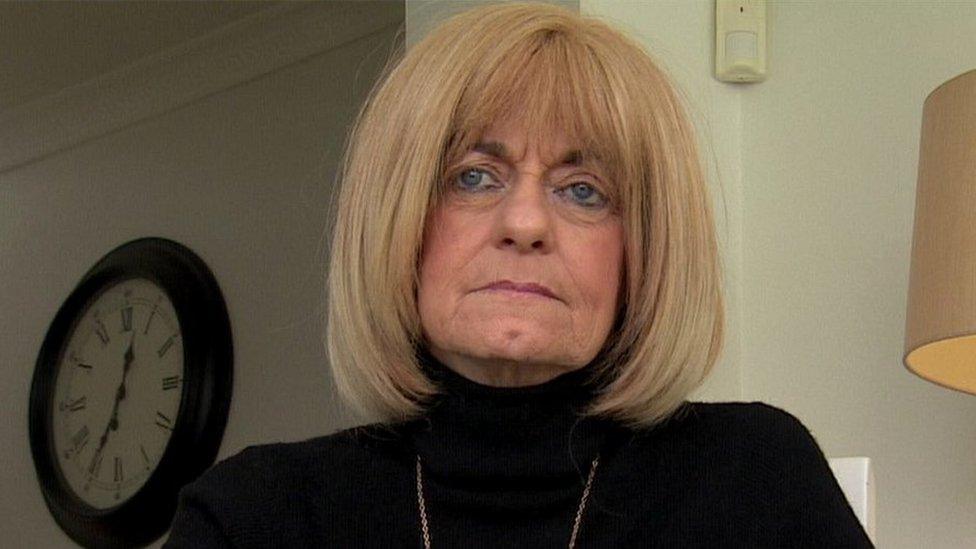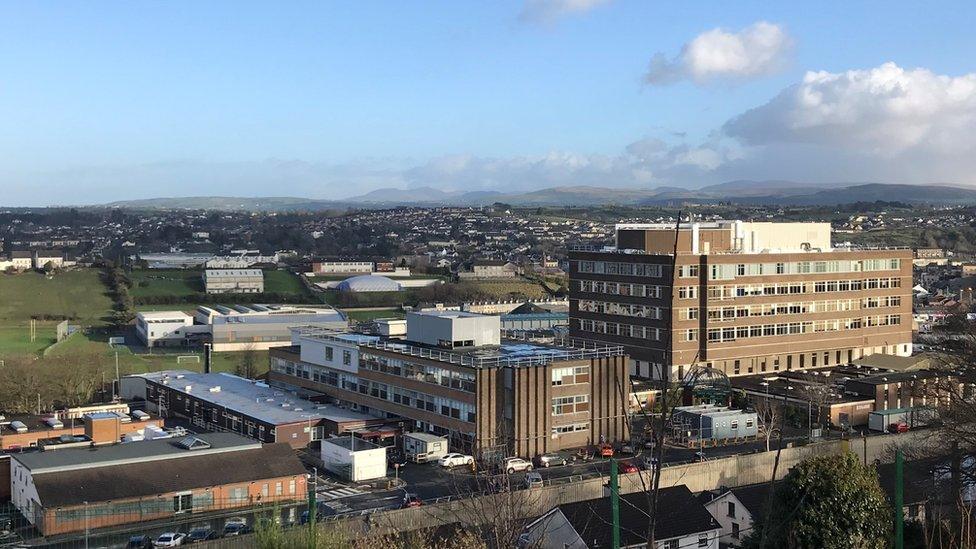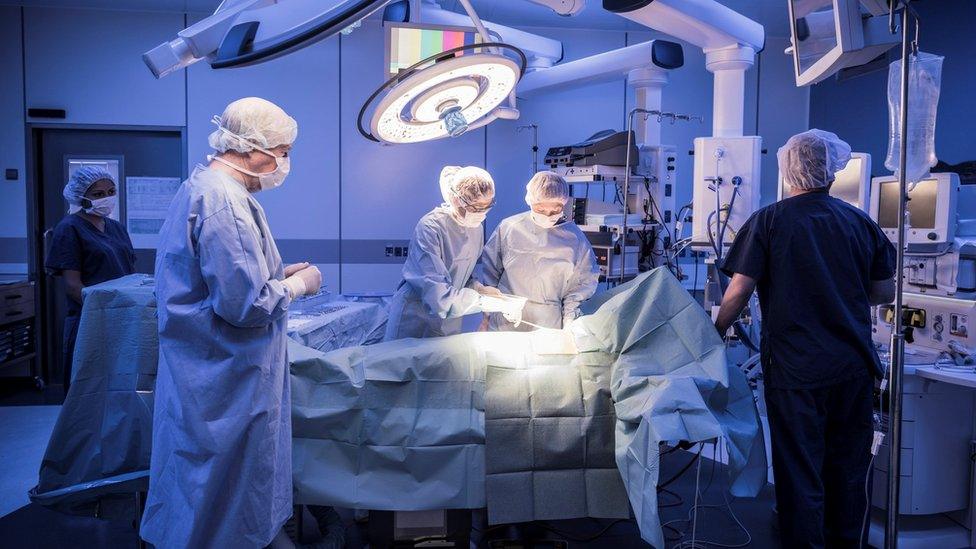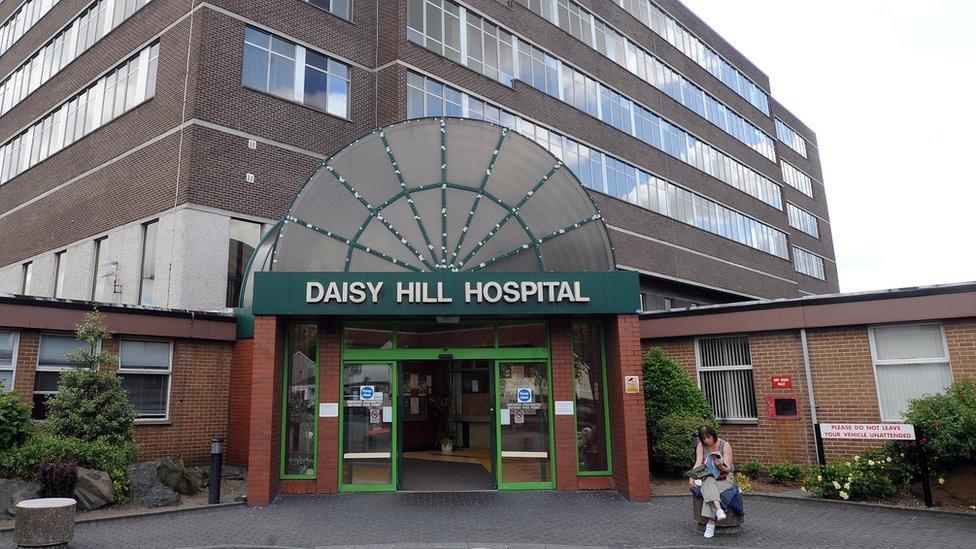Daisy Hill emergency surgery move branded 'disgraceful'
- Published

Ann O'Brien was brought to the hospital with a ruptured stomach and bowel in 2019
Plans to move emergency surgery from Daisy Hill Hospital to Craigavon must be abandoned, a woman who received life-saving surgery at the hospital has said.
Ann O'Brien, 61, was brought to the hospital with a ruptured stomach and bowel in 2019.
The hospital in Newry is just five minutes from her home.
Mrs O'Brien said her husband was told she "wouldn't have made it" had she travelled to Craigavon Area Hospital.
The Southern Health Trust has announced moving emergency surgery to Craigavon was temporary, and a result of not having enough surgeons at Daisy Hill.
The Royal College of Surgeons said the issue highlighted that it is not about where life-saving surgery takes place - but rather who is carrying it out.
"When you are extremely sick you want to be operated on by surgeons who operate every day and not by someone who does it occasionally," said consultant surgeon Mark Taylor.
Mr Taylor said the ongoing debacle over Daisy Hill highlighted the need for a public conversation about transformation in order to provide safe hospital services.
'Disgraceful' move
As highlighted in several expert health reports, staffing across many specialities is stretched as services are duplicated both between and within health trusts.
But Mrs O'Brien said the move was "disgraceful", and that lives would be lost as a result.

Daisy Hill Hospital has been unable to recruit enough surgeons to maintain its emergency surgery services
The Southern Trust said it was a "contingency solution" to address a "very immediate and major patient safety risk".
It means that from the end of February, all general emergency surgical patients requiring inpatient assessment in the Southern Trust will be admitted to Craigavon Area Hospital.
A consultation on the future of the service is due to start this summer.
Mrs O'Brien said after she was brought to Daisy Hill's emergency department, a scan was arranged and surgery was carried out almost immediately.
"We were seen very quickly, the staff were brilliant," she told BBC News NI.
"While I was being brought to surgery my husband was told that if I didn't have it straight away I wouldn't make it."
Her story raises the importance of having a range of services, including skilled surgeons and operating teams, under the one roof.
Daisy Hill Hospital does not currently have enough surgeons to square that circle: By the end of the month, only one of six permanent consultant general surgeon posts will be filled.
The Southern Health Trust said plans to recruit had not been successful.
Too far away?
Trade Unions argue that more could have been done over the years to retain staff and instead services have been allowed to be run down.

Last month, ongoing recruitment challenges meant Daisy Hill's emergency surgery was moved to Craigavon Area Hospital
The Unite Union said it was alarmed when the proposal to move surgery was announced.
A recent trust board meeting heard senior managers said it was not about one individual hospital but instead the entire southern trust providing safe services for all its patients.
According to those living in areas such as Kilkeel, Craigavon Area Hospital, which is over one hour away, is too far to travel especially in an emergency.
Mark Taylor said it was not about hospitals closing but hospital sites being used differently.
"This is not about closure it is about redesign and it is not about anyone losing out," he said.
Services 'spread too thinly'
BBC News NI has learned the Southern Health Trust plans to increase paediatric surgery at Daisy Hill hospital, turning it into a regional facility.
While some operations are already carried out, under transformation the hospital would become a regional centre for children's surgery.

Health experts have repeatedly warned that Northern Ireland's health service needs major reform
Mark Taylor said that with waiting lists "soaring", why would they want to close hospitals or lose hospital beds when the need for services was growing?
"We just need to do things differently," he told BBC News NI.
The health think tank, Nuffield Trust, has carried out several reports on the local health service.
Its head of public affairs, Mark Dayan, said services being spread too thinly had "probably contributed to the very bad hospital waiting times it suffers from."
Mr Dayan added: "It's probably not doing any favours to people's clinical outcomes for the most serious killer diseases."